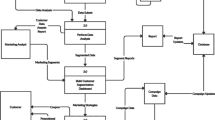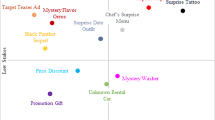Abstract
Electronic communities can be designed to organize consumers, to pool their purchasing power, and to guide their purchasing decisions. Such commercial electronic communities have the potential to facilitate the creation of novel marketplaces, and even radically change the buyer-seller interaction, as physical communities did throughout the history. Commercial electronic communities are groups of consumers that participate in the marketplace as a single unit. In addition to bargaining power gained from such bundling, such communities can expand markets by reducing market uncertainty, and they have the potential to drastically reduce consumers’ transaction costs, by facilitating group transactions and bulk purchasing. Communities are characterized by their size, their pricing strategy, and their membership characteristics. Analytical models and numeric analysis is utilized to compute the optimum size of a community for given market characteristics. Two major community pricing strategies are analyzed to improve the community design, and the conditions are derived where one dominates the other. Finally, market segmentation techniques are introduced to control the membership characteristics of the community to further improve the design.
Similar content being viewed by others
References
Anand KS, Aron R. Buying on the web: A comparison of price discovery mechanisms. Management Science 2003;49(11):1546–1562.
Armstrong A, Hagel J. The real value of online communities. Harvard Business Review 1996;134–141.
Bakos Y, Brynjolfsson E. Bundling and competition on the internet: Aggregation strategies for information goods. Marketing Science 2000.
Bakos Y, Brynjolfsson E. Bundling information goods: Pricing, profits and efficiency. Management Science December 1999.
Balasubramanian S, Mahajan V. Economic leverage of virtual community. International Journal of Electronic Commerce Spring 2001.
Burnett G, Buerkle H. Information exchange in virtual communities: A comparative study. Journal of Computer-Mediated Communication 2004;9(2).
Burns D. Family as a consumer. Psychology and Marketing 1993;10:79–80.
Hagel J, Brown JS. Out of the Box: Strategies for Achieving Profits Today and Growth Tomorrow Through Web Services, HBS Press, 2002.
Hanson W, Martin K. Optimal bundle pricing. Management Science 1990;32(2).
Ireland N, Law P. A Cournot-Nash model of consumer cooperative. Southern Economic Journal 1983;49:706–716.
Lechner U, Hummel J. Business models and system architectures of communities. International Journal of Electronic Commerce 2002;6(3):41–82.
Mougayar W. Opening Digital Markets, McGraw Hill, 1998.
Orman LV. Electronic markets, Hierarchies, Hubs, and Intermediaries. Information Systems Frontiers 2002;4(2):207–222.
Porter P, Scully G. Economic efficiency of cooperatives. Journal of Law and Economics 1987;30:489–512.
Preece J. Online Communities: Designing Usability and Supporting Sociability, Wiley, 2000.
Rheingold H. The Virtual Community: Homesteading the Electronic Frontier. Addison Wesley, Reading, MA, 1993.
Sandler T, Tschirhart JT. The Economic theory of clubs: An evaluative survey. Journal of Economic Literature 1980;18(4):1481–1521.
Schmid B. Requirement for electronic market architectures. International Journal of Electronic Commerce 1997;7(1):3–6.
Schneider GP, Perry JT. Electronic Commerce, Thomson Learning, 2001.
Suttles GD. The Social Construction of Communities, University of Chicago Press, 1972.
Varian H (ed.). Computational Economics: Modeling and Analysis with Mathematical, Springer/Verlag Publisher, 1996.
Williams RL, Cothrel J. Four smart ways to run online communites. Sloan Management Review, Summer 2000;81–91.
Author information
Authors and Affiliations
Corresponding author
Additional information
Levent V. Orman is a professor of Information Systems at Cornell University, Graduate School of Management. He received a Ph.D. degree from Northwestern University. He has taught courses and written articles on electronic commerce, database management, decision support systems, and expert systems. His recent articles appeared in Journal of Information Technology and Management, Journal of MIS, Acta Informatica, and IEEE Transactions on Knowledge and Data Engineering. He is the associate editor of the Journal of Database Management, and serves on the editorial board of the Journal of Information Technology and Management.
Rights and permissions
About this article
Cite this article
Orman, L.V. Optimum design of electronic communities as economic entities. Inf Syst Front 8, 179–194 (2006). https://doi.org/10.1007/s10796-006-8778-9
Received:
Revised:
Accepted:
Issue Date:
DOI: https://doi.org/10.1007/s10796-006-8778-9




